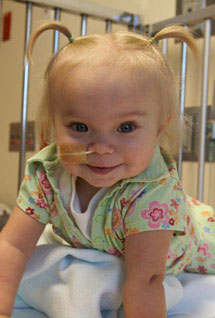Gracie Greenhoff

Gracie, the child of a thousand faces
Sometimes a patient cheers up the doctor and nurses. Gracie Greenhoff, for example, is not yet two years old. She has born with kidney disease that requires
repeated visits to the hospital. For months she underwent kidney dialysis at home each night until she received a kidney transplant in September.
But Gracie thrives as a happy, exuberant child who fills a room with laughter and selections from an endless repertoire of facial expressions. “A lot of children who have renal failure are pretty energetic when they are healthy. Even when Gracie is sick, she is still pretty lively,” said Ellen Wood, M.D., director of nephrology at SSM Cardinal Glennon Children’s Medical Center. “These kids seem to be in the hospital a lot, and they all know everybody here. Many of them have little fan clubs of their own.”
“Gracie loves it here,” said her mother, Jenn. “She gets so much attention. Everybody knows her. Even the people we see in the café know her. When we go through the hallways people are yelling her name.”
Gracie was born on December 13, 2005. A week before her birth, an ultrasound examination revealed abnormalities in her kidneys. Gracie was transferred to Glennon when she was three days old.“The hardest part was when she came over in the ambulance and we were riding behind it. That still breaks my heart,” Jenn said. Jenn said she and husband Ryann began to feel more hopeful after they arrived at Glennon.
“As soon as we got here, four doctors were figuring her out. One was drawing us pictures,” she said. “They included us in the process. We sat beside the bed and they brought machines to her and did everything in front of us. They gave me the information I needed. When we came here, we let our breath out. We knew this was where we were going to be.”
The kidneys filter waste products from the blood so they can be excreted in urine. Kidneys also help regulate the body’s fluid balance, blood pressure and production of red blood cells. Gracie was born with multicystic dysplastic disease in her left kidney. “That kidney was obstructed during development and is non-functional. She had significant obstruction in the other kidney that caused it to develop abnormally with renal dysplasia. That kidney carried her through her first year or so,” said Wood, a professor of pediatrics at Saint Louis University School of Medicine.
The right kidney became infected when Gracie was about nine months old. Its function diminished to the point that she needed to begin dialysis. Another bout of infection necessitated the removal of that kidney in June.“Dialysis was the only thing cleaning her out,” her mother said. “She was on dialysis 13 and a half hours a night. She had to remain in a chair or a bed next to the machine.” Gracie has been hospitalized seven times, the longest stay lasting more than three weeks. She visits Glennon for checkups once to twice a month.Gracie is fed through a tube because she, like many patients with kidney disease, has little appetite. Otherwise, her days are pretty normal for a two-year-old. “She likes to play with her brother, Eric, and crawls around the house,” Jenn said.Eric, who is 4 years old, “is just as energetic and happy as Gracie,” she said.
That energy brightens the day for Gracie’s doctors, nurses and technicians when she visits Glennon. When she is in the ambulatory care center, she often is visited by nurses who have cared for her on the inpatient floors.“She has never-ending expressions,” mom said. “She comes up with new ones every day. She has the ‘Oh!’ face, the sad face and the mean face. She can walk into the room and have an all-new expression.”“Kids who are in the hospital a lot have a lot of x-rays, see the lab people all the time and know the nurses. They know a lot of doctors, the people who clean the rooms and the people who bring the food trays,” said Wood. “The know lots of people and that helps them feel more comfortable when they are here.”
After receiving her kidney transplant on September 13, Gracie’s quality of life will improve significantly, Wood said. “Her life will be more normal. She will learn to eat on her own again, she will grow and she won’t be hooked to a dialysis machine for 13 hours a day. Dialysis takes a huge amount of work on the part of the family and medical team. Gracie’s mom is a special person to do all of this, and she has a wonderful family supporting her.” (words removed) Gracie will require medication and ongoing care throughout life. The nephrology division at Glennon follows about three dozen patients who have received kidney transplants.
Many other children who have received kidney transplants at Glennon have reached adulthood and are being followed by the transplant team at Saint Louis University. Wood said one of those graduates received her kidney at eight months of age and now is 22 years old.“There is stress in having a child who is sick. Then I take a walk around the hospital and see how many kids have it worse,” Jenn said. “Gracie has touched more people in her two years than I ever will. We hope she can keep doing that, just walking into a room and making people smile. We want her to grow up and lead a long, happy, love-filled life. We want that for both our kids.”